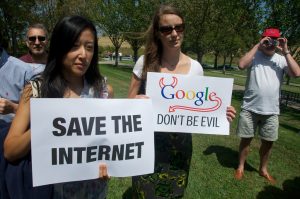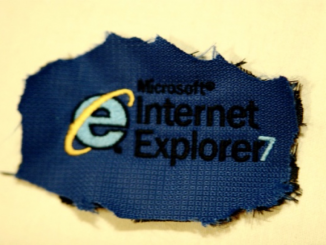If you are not paying for the product,then you are the product. —The Social Dilemma

Image by Carlos Veira Lorenzo is licensed under CC BY-NC-SA 2.0
In the past 20 years, Internet technology has developed rapidly. In modern times, people rely on media for social communication, search, entertainment, shopping, travel ad so on. In the words of Deuze (2011), “We live in media, rather than with media.” However, the penetration and immateriality of media also make people worried. People are beginning to notice the bad influence of technology and technology companies. The term “Techlash” was coined by The Economist in early 2018 to describe growing discontent among the public, politicians and governments with the power of “Big Tech”.
People’s concerns are not groundless or exaggerated. “The fuel for the techlash fire came at least in part from actual events, including, among others, the revelations Russia used social media platforms to interfere with the 2016 U.S. elections, Cambridge Analytica misused Facebook data for political purposes, and Google was investigated for antitrust violations,” Summarized by WSJ(2020) from ITIF’s report.

“Net Neutrality protest at Google HQ – GoogleRally 31” by Steve Rhodes is licensed under CC BY-NC-ND 2.0
Public Concerns

Given the facts above, it’s easy to understand people’s concerns. The first focus will be on Consumer Privacy. The platform automatically collects (through hardware and software) large amounts of data, including content data and user data. The operation and profit of the platform is basically user information. As Roger McNamee said in The Social Dilemma, “We are not the customers, advertisers are the customers, and we are the products being sold.” It sounds creepy.
Image by Alan Cleaver is licensed under CC BY 2.0
Social media and search engines create filter bubbles, that is, “echo chambers in which Internet users only consume information from like-minded sources.”( ITIF,2019) Algorithms push information users may like to attract users, but it also makespeople trapped in Information Cocoon. It also feeds extremism and hates speech.
Van Dijck, J., Poell, T. & De Waal, M. (2018) showed that most of power of network platform is held by a few companies, and controlling key nodes of information service. The Big Five forms the core of the ecosystem on which other platforms and applications are built. Even public and non-profit platforms rely on them. Their full penetration or even monopoly of basic needs would have dire political consequences.

“social problems” by peretzpup is licensed under CC BY-SA 2.0
New cultures are often blamed for social problems, with studies showing in The Social Dilemma that social media has a negative impact on children’s mental health. For example, beauty cameras, the impact of social media aesthetic preferences on teenagers and children’s self-image perception. More seriously, adolescents and children are almost completely defenceless in the face of pornographic and violent messages.
What is more, there are some concerns, such as the rapid spread of false information such as false advertising and fake news; Tech companies pay taxes unfairly and avoid taxes easier because they own lots of intangible assets; Technology shocks jobs and leads to mass unemployment; It companies consume too much energy and accelerate climate change, worsening the environment and so on.
Governance
For the digital economy to thrive and remain competitive, countries must create a stronger dialogue between regulators, experts, developers and citizens. Countries must boycott techlash and promote acceptance of technology.
Tackling Techlash starts with addressing public concerns. The most intuitive way to do that is, “In Europe, the Big Five have been taken to court on antitrust charges (Google), preferential tax treatment (Apple), and breach of privacy rules (Facebook).”(Van Dijck, J., Poell, T. & De Waal, M. , 2018) “The European Union’s General Data Protection Regulation (GDPR), implemented in May 2018, has formed the basis for a de facto global standard on data protection and privacy.”(Flew, T. Martin, F. & Suzor, N., 2019) “The European Union Digital Services Act, due to be unveiled by early 2021, will include rules on how big online firms should moderate content, deal with user complaints, treat rivals that also use their platforms,  interconnect with competing services and share data.”(The Economist,2020) “National governments are increasingly challenging the power and influence of these global digital media companies, and seeking strategies to regulate their content and operations.”(Van Dijck, J., Poell, T. & De Waal, M., 2018) But legislation to rein in the tech giants will take time.
interconnect with competing services and share data.”(The Economist,2020) “National governments are increasingly challenging the power and influence of these global digital media companies, and seeking strategies to regulate their content and operations.”(Van Dijck, J., Poell, T. & De Waal, M., 2018) But legislation to rein in the tech giants will take time.
Image by sturgill is licensed under CC BY-NC-SA 2.0
Van Dijck, J., Poell, T. & De Waal, M. (2018) believe that “responsibility and accountability do not solely rest with the institutional and legal frameworks that scaffold societies. Companies, too, share this responsibility.” Platform operators should be held social responsible when spreading negative social information, such as false advertising, extremism and misinformation. Companies increasingly monitor, manage and remove content, restricting and blocking some users. Self-policing of platform content aims to reduce offensive and anti-social behaviour; Avoid publishing illegal or harmful content; Protect individuals, especially vulnerable groups such as children. However, “the velocity at which users publish content mean that it is impossible for platforms to pre-moderate, or review it all in advance.”(Flew, T. Martin, F. & Suzor, N., 2019)

Image by FauxNeme is licensed under CC BY-SA 4.0
Flew, T. Martin, F. & Suzor, N. (2019)explained that “the major work of regulating the Internet today is undertaken by large technology and telecommunications companies. These intermediaries govern their networks in ways that further their own economic interests. as various groups of governments, users, private interests and civil society learn how to more effectively regulate the behaviour of users indirectly by making demands of intermediaries.”
In addition, Van Dijck, J., Poell, T. & De Waal, M. (2018) pointed out that local governments can actively shape the realization of public value through platforms in an active and comprehensive way. For example, Amsterdam used institutional constraints on Airbnb to narrow the wealth gap. Government agencies are increasingly partnering with global business platforms to address pressing social issues.
China’s Techlash
China is tightening restrictions on big tech companies:
- Halted fintech giant Ant Group’s $37 billion initial public offering and forced it to transform its asset-light business into something more like a bank.
- The two biggest companies, Alibaba and Tencent, have become targets of antitrust regulators.
- Regulators banned Didi’s taxi-hailing app in New York, citing data irregularities
It is worth mentioning the Techlash phenomenon in China, as it is arguably the most successful regulatory regime in the world. Foundfuel(2021) explored that China encourages the development of tech players. The state is not just a “willing partner” for tech startups, but also negotiates the boundaries of state-society boundaries. But once the state built a critical mass, the country’s leadership pings back and squelches Big Tech.
“In an authoritarian state, it is unimaginable that any non-state actor has more access to information about its society in the form of data”—Foundfuel(2021)
Interestingly, although both the state and the platform are strengthening regulation, people don’t seem to care very much. While there are teshlash feelings and fears about platforms, there are few real boycotts. According to the AMA(2019), “Social media is massive and exploding. Users expect to spend more time on all in three years, with a net gain for all social media of 34%.The trend is the same for other online media, with net increases forecast for websites (42%), email (12%) and streaming media (5%). Some 70% or more feel the changes will make shopping more fun, easier, quicker and better-informed, as well as improve access to goods and bolster brand understanding.”
Reference List
Atkinson, R. D., Brake, D., Castro, D., Cunliff, C., Kennedy, J., McLaughlin, M., McQuinn, A., & New, J. (2019). A Policymaker’s Guide to the “Techlash”—What It Is and Why It’s a Threat to Growth and Progress. Itif.org. https://itif.org/publications/2019/10/28/policymakers-guide-techlash
China’s techlash gains steam. Again. (2021). The Economist. https://www.economist.com/business/2021/07/28/chinas-techlash-gains-steam-again
Craig, C. (2019)Why Should You Care About the Techlash? American Marketing Association. https://www.ama.org/marketing-news/why-should-you-care-about-the-techlash/
Deuze, M. (2011). Media Life. Media, Culture and Society, 33(1), 137–148.
Flew, T. Martin, F. & Suzor, N. (2019) Internet regulation as media policy: Rethinking the question of digital communication platform governance. Journal of Digital Media & Policy, 10(1), 33–50.
G Venkat, R. (2021) State Vs Big Tech: The three drivers of Chinese techlash. Founding Fuel. https://www.foundingfuel.com/article/state-vs-big-tech-the-three-drivers-of-chinese-techlash/
LUDWIG, S. (2020) Reining in the technology giants will take time. The Economist. https://www.economist.com/the-world-ahead/2020/11/17/reining-in-the-technology-giants-will-take-time
Tech giants face new threats from the government and regulators. (2019). The Economist. https://www.economist.com/united-states/2019/03/14/tech-giants-face-new-threats-from-the-government-and-regulators
Van Dijck, J., Poell, T. & de Waal, M. (2018) The Platform Society. Oxford: Oxford University Press, pp. 5-32 (‘The Platform Society as a Contested Concept’).
Wladawsky-Berger, I. (2020). Why the “Techlash” Is a Threat to Growth and Progress. Wall Street Journal. https://www.wsj.com/articles/why-the-techlash-is-a-threat-to-growth-and-progress-01591464654


